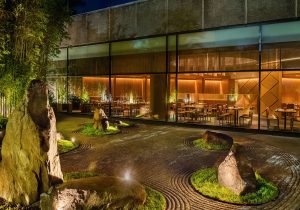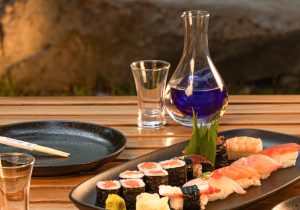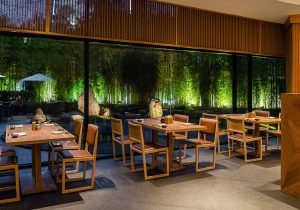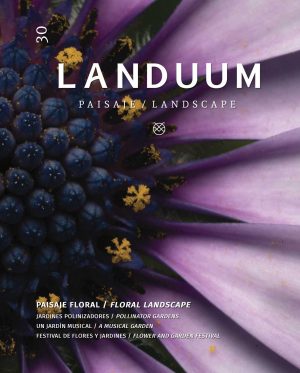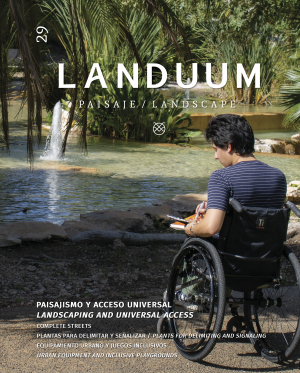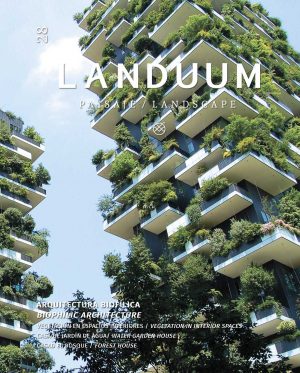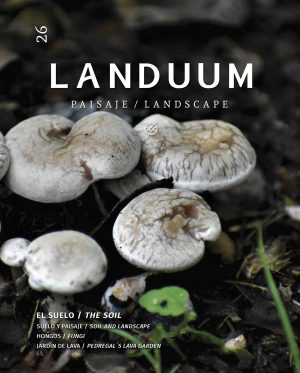
Yoshimi
Meet Yoshimi, a restaurant project with a garden inspired by Japanese nature by architect Alfonso Muray.
Located in the Hyatt Regency Mexico City hotel, in the heart of Polanco; the renowned restaurant reopens its doors and presents its new identity, whose minimalist and function – al design exalts the tradition and avant-garde of Japan. In Japanese culture, the Kaizen method evokes the idea of making a series of changes to promote continuous improvement. Inspired by this premise, the Yoshimi restaurant transformed its experience, preserving its imprint: the attachment to traditional cuisine, which has identified it for several decades as an essential reference in the culinary scene of Mexico City.
A fundamental part of the transformation is pointed out in the revitalization of architecture and interior design. Commissioned by the Akira Kameta Miyamoto studio, the project captures a traditional, functional and contemporary style, based on three basic pillars: simplicity, harmony and a faithful reinterpretation of Japanese culture. For this purpose, in addition to preserving the emblematic Zen garden, a set of special rooms were created that offer different perspectives for the diner: a main hall, a sushi bar, private rooms and a corridor that connects them and where traditional Japanese ceramic pieces are exhibited.
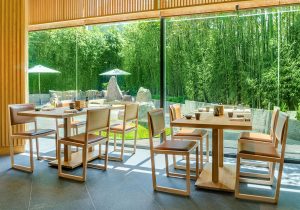
Restaurant interior
Photography: Cortesía de Hyatt Regency Mexico City
In each atmosphere, the search for a visual canon based on geometric lines and volumes can be appreciated. The warmth of the wood in neutral tones stands out on the walls, thanks to the work carried out with the Asa motif, considered since the Heian period as a talisman that expresses prosperity, carved with the ancestral Kumiko technique. The exquisite cabinetry, which contrasts with the gray nuances of the porcelain tile and the wood and leather furniture, gives the space a component of simplicity without artifice. In the main hall, where the delicate linen fabric sculpture by the artist Agnieszka Kotecka stands out, the good luck motifs are magnified in screens and walls that provide privacy without sacrificing light. In the private rooms, whose sloping ceilings recall the structure of typical chashitsu houses, tribute is paid to the legendary tea ceremony by creating cozy spaces bathed in a serene and subtle light, which dialogues with the archi – tecture and expresses the dramatic character of the game of lights and shadows.
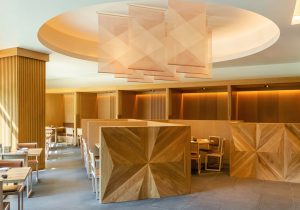
Wood in neutral tones stands out on the walls
Photography: Cortesía de Hyatt Regency Mexico City
Sensory delight is a predominant value at Yoshimi, which is why the Zen garden, a private, open-air area, regains its splendor to invite contemplation in one of the busiest areas of the city. In its landscaping, the work of the architect Alfonso Muray, the Karesansui concept is reinterpreted to introduce the visitor to self-reflection, while admiring an organic composition in which the landscape borrowed from the Winston Churchill garden, a dense bamboo wall and eleven rocks distributed in five islands surrounded by white marble sand, raked in undulating patterns to evoke the waves of the sea.
“In its landscaping, the Karesansui concept is reinterpreted to introduce the visitor to self-reflection.”
Zen Garden
Photography: Cortesía de Hyatt Regency Mexico CityIn the new chapter of Yoshimi, chef Miriam Moriyama, a pioneer “sushi woman” in Latin America and who was in charge of the Shiso restaurant in Rio de Janeiro, Brazil, recognized by the Michelin Guide, born in Argentina and of Japanese parents, joins to celebrate and preserve the authenticity that has positioned this restaurant as a gastronomic benchmark among the Japanese community and the gourmets who congregate around its table. Throughout Moriyama’s career, his training in Tomaya and Tokyo and multiple awards and recognitions stand out. On the menu, the emblems of the Japanese culinary tradition take center stage. The extensive menu is divided into two sections: the first incorporates the foundational classics such as akami tataki, misoshiru soup, vegetable tempura, rice dishes, noodles and the most exceptional specialties, among which the shabu shabu with wagyu stands out. The second, dedicated to the bar, includes nigiris, makis and sashimi that are prepared following the ancestral processes.
Nigiris y makis
Fotografía / Photography: Cortesía de Hyatt Regency Mexico CityYoshimi’s wine storage room stands out for its curatorship of sakes, whiskeys, gins and Japanese beers carefully selected to pair perfectly with the dishes. For its part, in the prelude to after-meal, the different dessert options unite east and west by intertwining flavors and traditions, such as in the kuzu kiri, a root jelly served with piloncillo syrup, while maintaining the classics, such as frozen vanilla tempura.
Interior del restaurante / Restaurant interior
Fotografía / Photography: Cortesía de Hyatt Regency Mexico City


